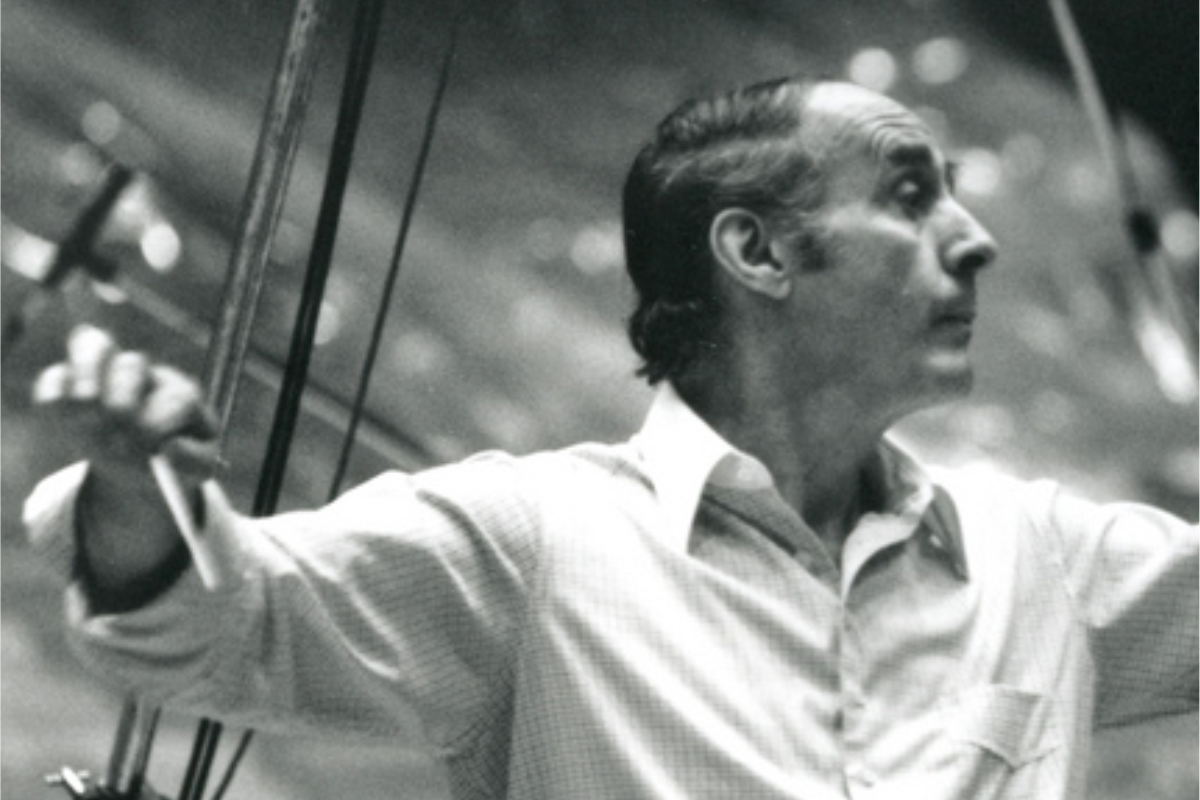
Soaked in a New York downpour, a party gal-about-town searches for her lost cat in an alley, the man whose love she’s resisted looking forlornly on. As she cries out for the pet, chords from a Henry Mancini score thump-thump like an agitated heart. A meow—and the truant feline emerges, soon to be cradled in the embrace of its owner and her would-be partner. A chorus sings above the rain—“Two drifters off to see the world . . . ” An aerial shot seals the story with the couple’s kiss.
Any fan of romance would treasure this final scene from “Breakfast at Tiffany’s,” the 1961 Blake Edwards film based on a Truman Capote novella, and perhaps want to hum along to “Moon River,” the movie’s Oscar and Grammy-winning Mancini theme, lyrics by Johnny Mercer. Better yet, go enjoy the song—indeed drifting away on its dreamy currents—among many of the composer’s standards in store at the Arsht Center for The Henry Mancini 100th Birthday Celebration on Friday, Nov. 3.
The multimedia event unites University of Miami’s Frost School of Music’s Henry Mancini Institute (HMI) Orchestra and the Frost Chorale with beguiling front artists that include Monica Mancini, whose voice—like the finest family crystal—rings out in her renowned father’s repertory with intimate authority.
“I try to bring something new to every song of his I perform,” says the singer, referring to a career she started as a teen alongside her mother and sister in the Henry Mancini Chorus. “Over the years, the lyrics—particularly those by Mercer—have evolved for me. I’m always finding a new gem to polish. So many artists have sung my dad’s music, but the ones I enjoy most honor his melodies as written—his chords were so distinct.” And, in fact, she confesses, instrumental jazz versions of his compositions are her preference.
At the centennial concert, film and interview excerpts will also highlight Mancini’s genius, which for decades had an unsurpassed impact on cinema and television soundtracks, further embellishing the musical landscape through gold albums and crowd-pleasing concerts.
“Whenever I come across one of his films on TV, I usually tune in,” says the composer’s daughter. “The narrative of the film always influences my interpretation. There are deep and poignant messages within, which I hope to convey with each performance.”
That goes for the ever-flowing “Moon River” and others like “The Days of Wine and Roses” and “Two for the Road”—the latter a sentimental favorite of her parents—from the same-named movies.
Shelly Berg, dean of the Frost School and—along with Monica’s husband, music-industry giant Gregg Field—this show’s co-producer, underscores the reach of Henry Mancini’s magic. “He wrote music that the whole world knows—even if you don’t think you know it, you do. I’ve been in piano bars, in Hong Kong, across Europe, where you can’t listen for an hour without hearing ‘Moon River,’” says Berg.
Born early enough to swing through the Big Band Era, Mancini put his initial musical training to good use as a pianist and arranger for the reconfigured Glenn Miller Orchestra in the mid-1940s. A lengthy stint as musical contributor to Universal International Studios then had him mostly raising goosebumps for 1950s B movies —including, lovers of Floridiana take note, “The Creature of the Black Lagoon” in 3D, its underwater scenes filmed in Wakulla Springs, 14 miles south of Tallahassee. But this workaday role in the studio also led to his first Academy Award nomination in 1954, fittingly for the score of “The Glenn Miller Story.”
As an independent, Mancini sprang into a more prominent sphere with his score, both rocking and jazzy, for the television series “Peter Gunn.” The dogged rhythm of the once-heard, never-forgotten opening theme stalks toward alarming crescendos like a transcript from a wily detective’s files. Wait for it at the Arsht concert.
In 1958 “The Music from Peter Gunn” won Mancini the first-ever Album of the Year award at the Grammys—he went on to nab a total of 20 Grammys and four Academy Awards—and started a collaboration with series creator Blake Edwards that lasted through 35 years and almost as many projects. Until Mancini’s death in 1994, his compositions never stopped enhancing the scenarios, whether escapist or wistfully reflective, that various directors unfurled across screens.
“I think Dad had a wonderful sense of place and relevance,” says Monica. “There is a style that he brought television and film music for the first time that opened the door for other composers to put their jazz chops to work.”
Besides her seductive talent, honed close to her patrimony, Berg heralds other gifts in the centennial lineup. The dean singles out the prime presence of singer-guitarist John Pizzarelli, an all-around power in jazz and pop. His lickety-split plucking and kind of tart, kind of sweet stylizations, cool as popsicles for a forever summer, are perfect for the Henry Mancini sound.
Notable, too, in the show are Melvin Butler, an associate professor at the Frost School whose academic credits go with his agility at the saxophone; Dawnn Lewis, a Women Song Writers Hall of Fame inductee and award-winning artist across media, her voice like a soothing breeze until you realize she’s been fanning a fire; and, most intriguingly, young Ukrainian violinist Kostia Lukyniuk. This iconoclastic explorer of repertory for strings was accepted into the music master’s program at UM just as he faced the front in his war-besieged country. That may have saved his life and allowed him to expand a career initiated in childhood that continues in fundraisers for his people.
Sharing the wonder of Lukyniuk’s trajectory, Berg says, “Kostia’s amazing. Here we have a Ukrainian playing a country song—kind of a hoedown thing—Mancini wrote for a movie.”
That symbiosis of sounds and sights is a cornerstone of Mancini’s achievement. As Berg promises, “There’ll be some really great footage at the concert—from ‘Pink Panther’ and ‘The Days of Wine and Roses,’ and of course ‘Breakfast at Tiffany’s.’ Some of the music tracks along with the films just as when you’re recording a score.”
The symphony orchestra, with its jazz arm—all professionally poised graduate students at the Frost School, Professor Scott Flavin at the baton—will be engaged in a way that audiences don’t usually get to see in performance. And that’s a natural fit with the mission of HMI, says Berg, who in 2008 brought the organization to UM from Los Angeles at the start of his deanship, with eager cooperation from the faculty and his longtime friends and collaborators in the Mancini circle.
After its first base as a summer music institute, HMI is now part of a year-round, academic program, guiding participants in all the skills needed for career trenches and opening doors to big-hall gigs and other community-integrated activities, including the Arsht Center’s Jazz Roots series, which the Mancini celebration kicks off.
“This is going to be a really spectacular evening,” says Berg, who recognizes the source of Mancini’s allure. “You’re going to hear a wide variety of music where the common thread is how great the melodies are.” And those, he guarantees, can track and heighten the movie of anybody’s life.
WHAT: Jazz Roots: The Henry Mancini 100th Birthday Celebration
WHEN: 8 p.m., Friday, Nov. 3
WHERE: Knight Concert Hall at Adrienne Arsht Center for the Performing Arts, 1300 Biscayne Blvd., Miami
COST: $45, $55, $75, $95, $125
INFORMATION: (305) 949-6722 and arshtcenter.org
Read the full story at www.artburstmiami.com
